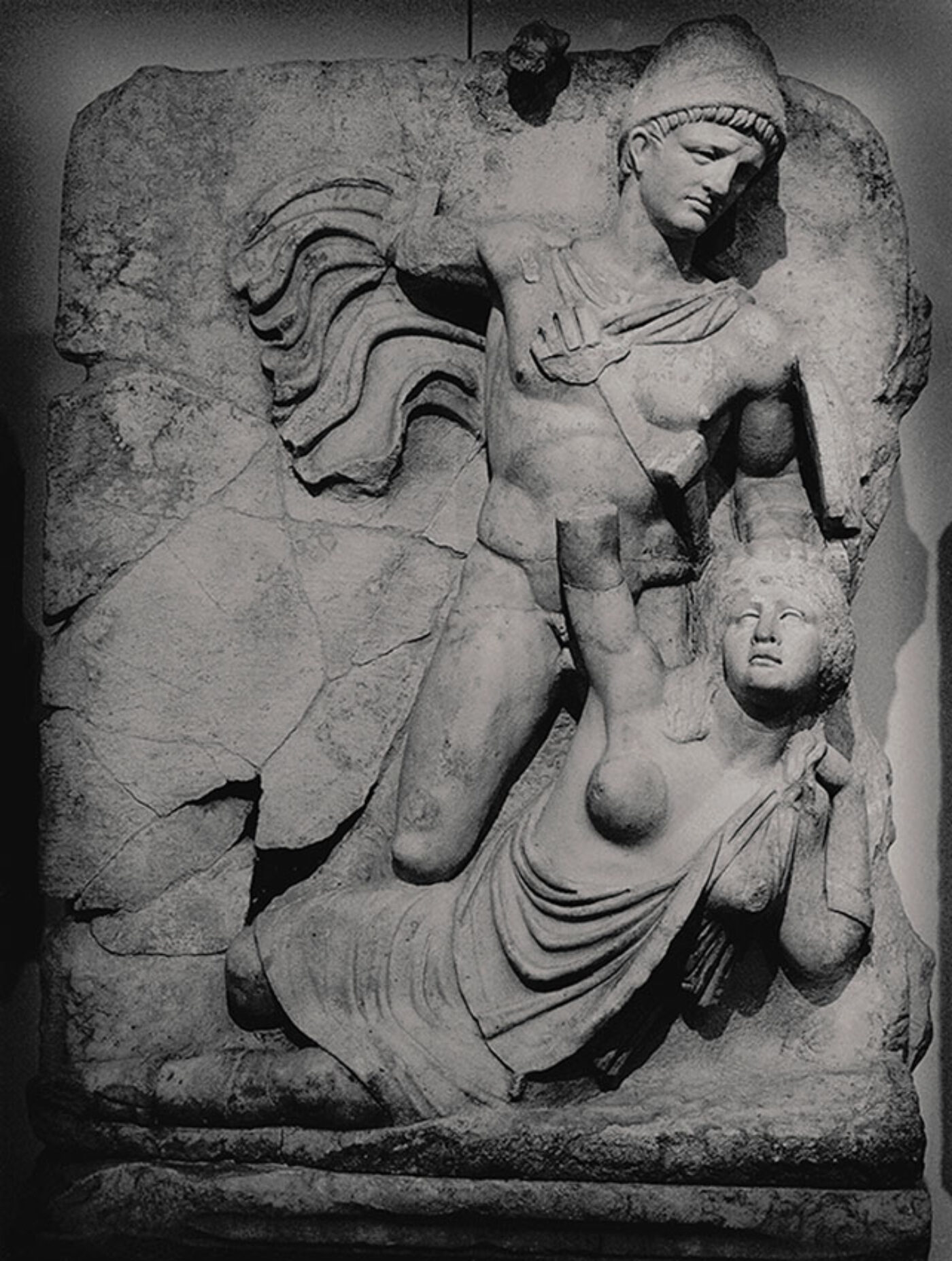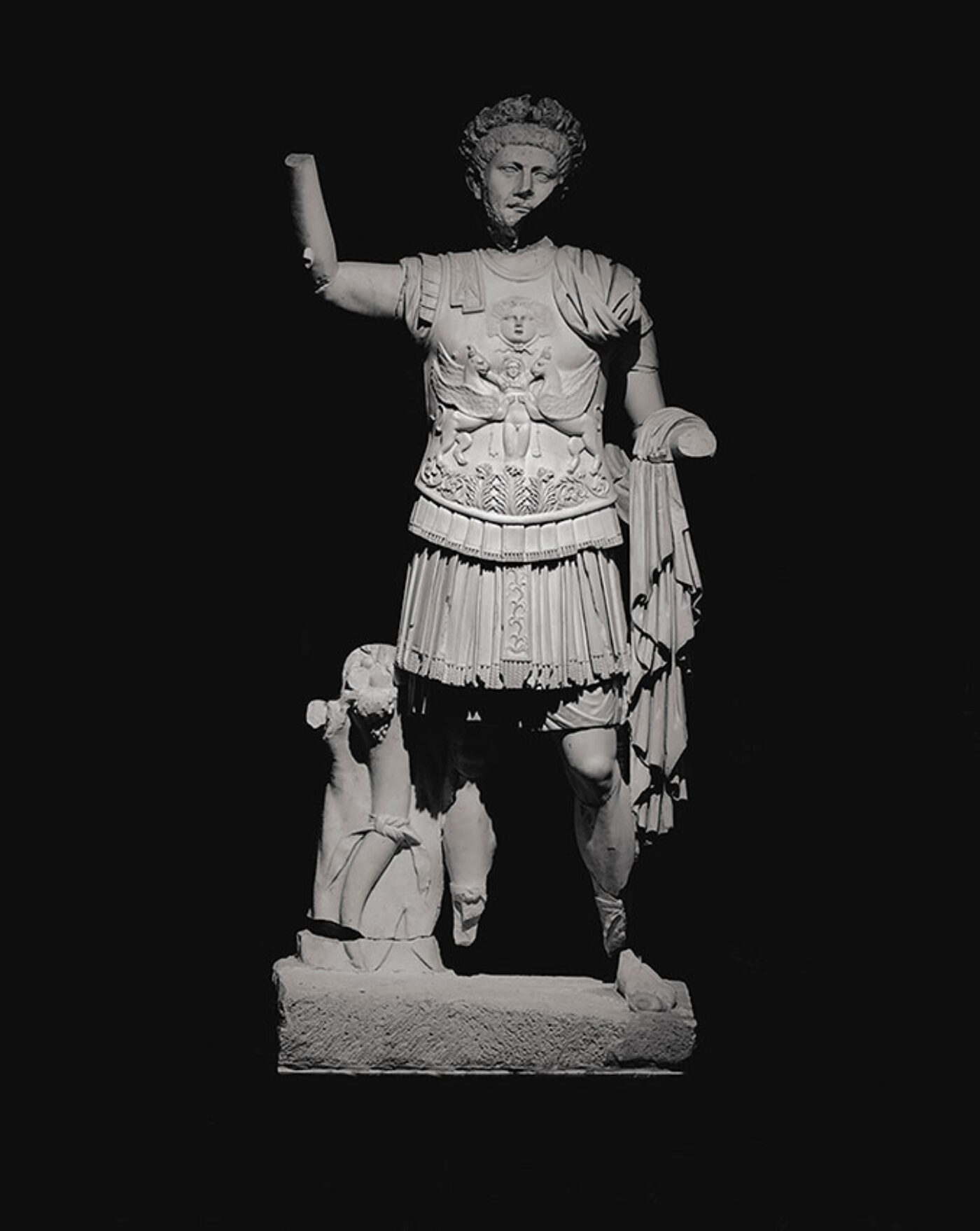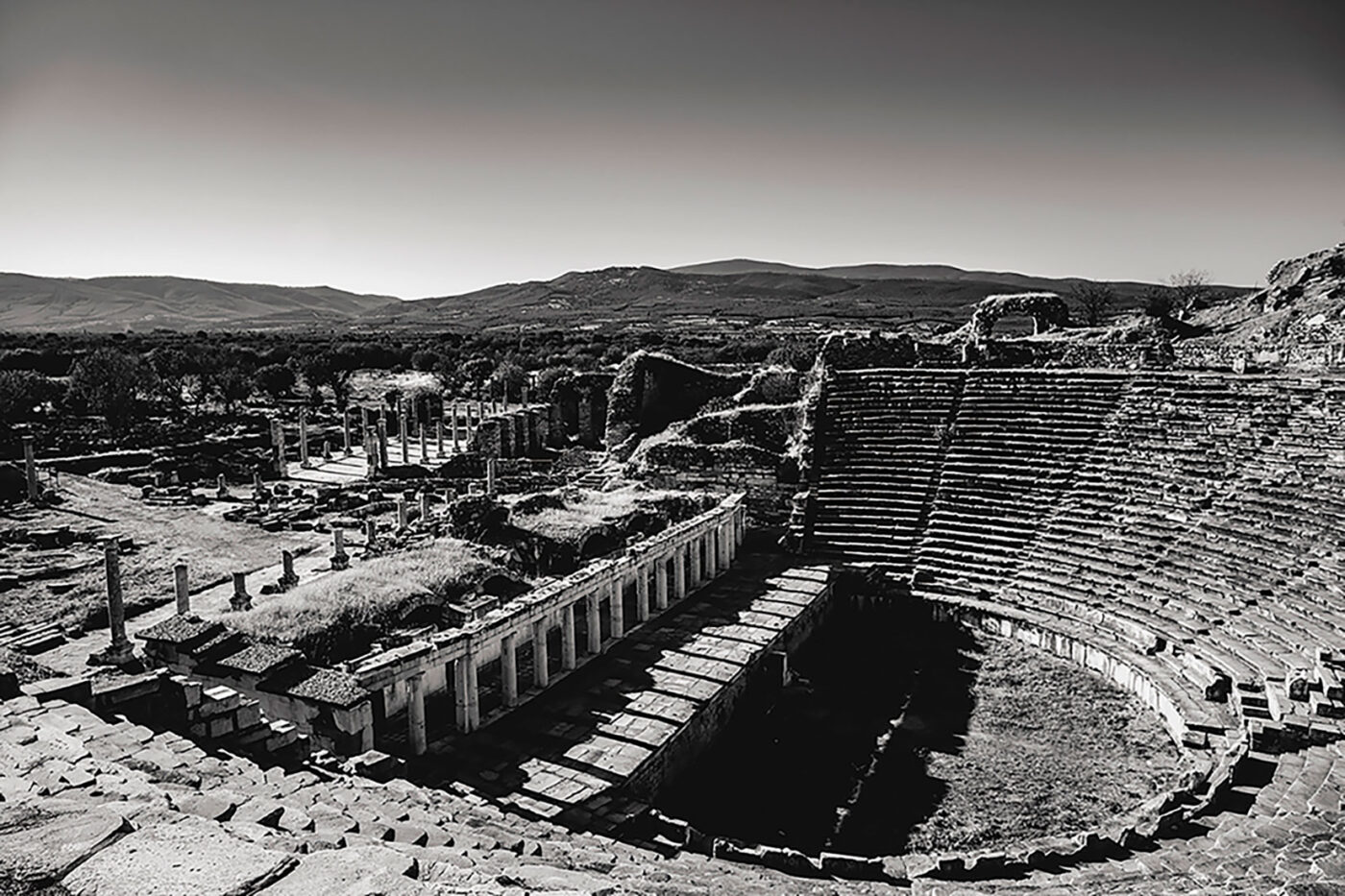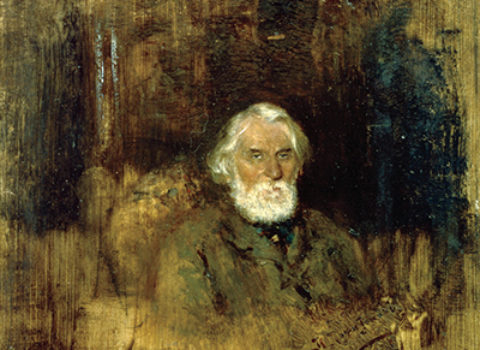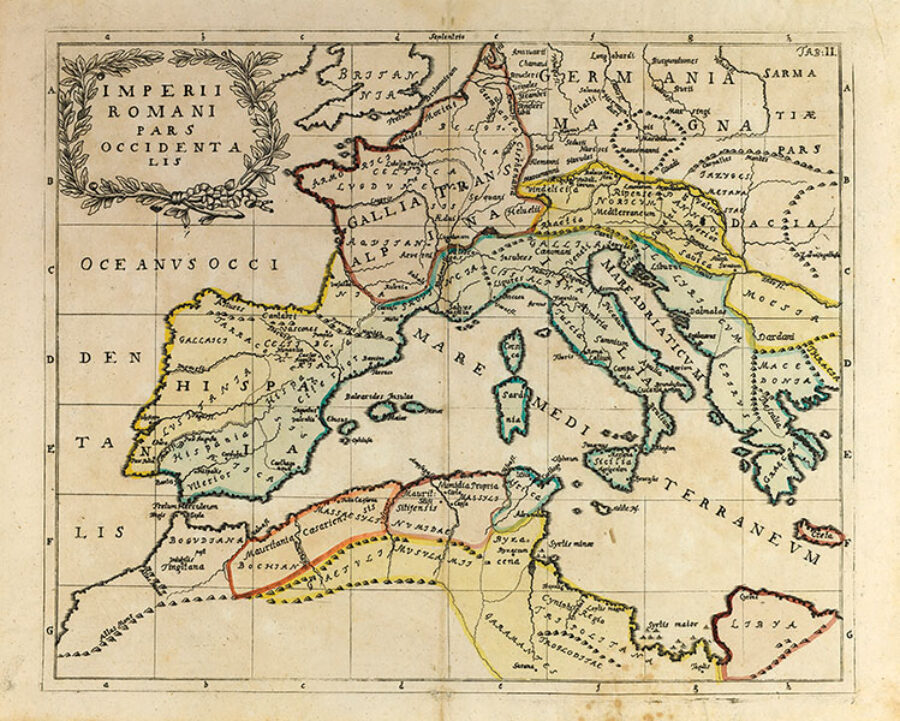
A seventeenth-century map of the Roman Empire © akg-images
Discussed in this essay:
Emperor of Rome: Ruling the Ancient Roman World, by Mary Beard. Liveright. 512 pages. $39.99.
If men think about the Roman Empire all the time, they do not do it under conditions of their own making. For over twenty years, men, and also women, have thought about the history of ancient Rome under conditions shaped by Mary Beard. As a Cambridge professor, a regular guest on the BBC, a best-selling writer, and the classics editor of the Times Literary Supplement, she is the most prominent classicist in Britain, with one of the largest readerships among members of her profession in the English-speaking world. In her native country, in particular, she is also a feminist role model, and she has dealt gracefully but firmly with extraordinary levels of sexist abuse from the likes of the late Sunday Times columnist A. A. Gill, who, as recently as 2012, felt able to devote a review of one of her documentaries to complaining that she wasn’t sufficiently primped and prettified for his taste.
Beard—who has spent nearly all her working life at Newnham College, Cambridge—is famous for maintaining skepticism and nuance while working at the poppier end of the spectrum. When her star rose in the Nineties, she was more sympathetic than most British academics to the politics, though not always to the scholarship, of projects like Martin Bernal’s Black Athena, which identified racism and colonialism in the organization of classics as a discipline: the way the study of ancient Greek culture has historically been kept separate from the study of the ancient Near East, for example. Now that she is herself, in effect, synonymous with the establishment, younger, fierier figures are said to grumble, from time to time, that her outlines of Roman history ought to be more disruptive of traditional categories. But a mixture of iconoclasm, old-fashioned authority, and a willingness to express ambivalence, even at the risk of annoying people, has been part of her appeal from the start.
For anyone curious about the ancient world, what’s most striking about Beard’s books and essays is their acknowledgement of the sometimes quite rickety scaffolding of evidence, guesswork, and fantasy supporting what historians think they know. And she has served as living proof that you don’t have to be Indiana Jones, or a bow-tied connoisseur, or an Old Etonian bullshitter, to find what Herodotus or Josephus have to say reasonably interesting. Her new book Emperor of Rome meets an obvious market demand: it’s Mary Beard on the Roman emperors, and it starts with a barrage of colorful tales about Elagabalus, a short-lived third-century ruler whose name was once a byword for exotic decadence. Beard trained in an intellectual environment in which stories about mad emperors were seen as a trivial distraction, and eminent scholars like Keith Hopkins would write disapprovingly about “the loving care given to individual details, largely for their own sake,” in their rivals’ books. What does her vision of the Roman Empire look like, and can she keep up a similar level of color while preserving her academic self-respect?
The most detailed report on the first Roman emperors to have come down from ancient times is a text known as the Annals, written in the early years of the second century ad by a Roman historian and politician named—probably—Publius Cornelius Tacitus. About a third of the way through the surviving books, which are filled with accounts of conspiracies, murders, and outlandish sexual wrongdoings, Tacitus pauses to consider his project and apologizes for the lack of excitement. Don’t judge me against earlier historians, he says. They got to write about the mighty growth of our empire, or the struggles between the people and the aristocracy. “My area of work is restricted and without glory: peace unbroken or only weakly challenged, grim episodes in the city, and an emperor with no interest in extending the empire.” Worse, he adds, it is all a bit monotonous. Betrayals, sadistic rulings, calamities descending on the innocent: in the end, they are “always the same.” On that front, he is “faced with a tedious abundance of recurrent material.”
Tacitus was describing the early decades of what’s now known as the principate, the first phase of one-man rule in Rome, which lasted from 27 bc to the empire’s near collapse in the third century. It’s called that after “princeps,” a title that the first emperor, Augustus, chose for himself, and from which we get the English “prince.” Back then, the word meant something less regal, more along the lines of “first citizen.” Augustus—a minor aristocrat, born Gaius Octavius, who was the last warlord standing after a series of civil wars—called himself princeps to imply that he wasn’t a king. Throwing out an evil king was part of Rome’s self-mythology. For centuries, members of its grandest families had competed annually for positions of power under a republican system. There were even elections, although the poor couldn’t run, and how much ordinary citizens could affect the results is debated. When the future emperor became a political player, in 44 bc, a number of senators had just underlined their commitment to Rome’s tradition of republican liberty by killing his great-uncle, Julius Caesar, who, they said, had aimed to make himself king.
Whatever his plans, Caesar had ruled under a republican title—“dictator” was a role you could be appointed to in an emergency—and could have argued that his position was still constitutional, even if the precedents weren’t good. But his death made it spectacularly clear that he hadn’t won over enough of the political class. Augustus took more time to figure out his own way of doing things. He presented himself as a restorer of the republic, as well as, more plausibly, the only man who could guarantee peace. The Senate continued to sit and wellborn people continued to fill the traditional roles, like the consulship, the highest political office, which Augustus didn’t keep for himself. His laws encouraged the upper classes to have more children and fewer extramarital affairs. Livia, his wife, was said to make him homely clothes, as virtuous Roman wives were meant to. And he himself made a show of ruling through existing institutions. There was lots of solemn business in the Senate about giving him the powers of various historic magistracies. Later on, he requested them for his chosen successor too.

Gold aureus of Augustus, first century BC. Courtesy the Metropolitan Museum of Art. Gift of Joseph H. Durkee, 1899
At the same time, Augustus was first citizen, and able to found a dynasty this way, because he had thousands of heavily armed men stationed permanently in the suburbs—and, for the first time, in the city itself. Rome’s wars had once been fought by citizen-soldiers who would pack up and go back to their farms after a summer spent conquering the Italian peninsula. The Roman chronicler Livy recounts a surprising moment in 406 bc when the Senate, after years of ignoring complaints that the aristocrats were keeping all land and loot, announced a concession: from then on, the troops would be paid on a regular basis. But that was before Rome took over most of the known world. By the first century bc, the republic swarmed with professional soldiers who were loyal to their commanders rather than the state. It was the commanders who distributed the loot, and gave veterans grants of land. Augustus, who rose to power as one such commander, took it upon himself to pay all salaries and retirement benefits. In the city, the security forces answered directly to him.
Augustus’ powers included choosing his successor. After his death, they passed to his stepson, Tiberius, a successful commander and administrator, then about fifty-five, with a reputation for being gloomy. Tiberius is reported to have been unforthcoming and diffident when the Senate confirmed his control of the empire. Perhaps he hated the whole charade, from the people, whose right to vote was soon curtailed, to the senators, whose grovelling, it’s said, disgusted him. Still, no one tried to restore the republic, either during the transfer of power or when Tiberius, years later, stalked away to brood on Capri. During his watch, new stock characters appeared in Roman history: a growing class of professional informers, the emperor’s possibly unreliable security chief, and the women in the imperial family as rumored schemers and poisoners. After an attempted coup by Sejanus, his security chief, Tiberius ordered up a bloodbath. Nearly all the story elements for the next two hundred years were now in place.
The sheer fakeness of elite life under this system—a disguised monarchy combined with military rule, in which an aristocratic oligarchy kept up the rituals of republican government—is one of the great themes of Tacitus’ Annals. Tacitus lived and worked under that system, though he was writing under more liberal emperors, or so he claims. He reached the rank of consul, and he’s thought to have studied the Senate’s records, among other lost sources. He also used his imagination here and there, as historians were prone to do. He specialized in mordant one-liners; of the conquered Britons’ weakness for dinner parties, hot baths, and other Roman treats, he observes: “They called it, in their ignorance, ‘civilization,’ but it was really part of their enslavement.” His ancient Roman moral assumptions can be hard to distinguish from a prevailing tone of dark irony. After murdering his mother, Tacitus says, Nero felt free to explore previously repressed depravities: “a hankering to drive a four-horse chariot, and a no less disgraceful desire to sing accompanied by the lyre like a stage-performer.”
Tacitus was almost certainly born during Nero’s reign, and by the time he wrote the Annals, there was about a century between him and Augustus. Even so, he put together a powerful depiction of a world hollowed out by lies. In the Annals, the politics of despotism means that even grief has to be suppressed or stage-managed for public consumption, and language is “a restricted and hazardous area.” Tacitus’ mention of “recurrent material” refers to trials under expanded treason laws: he’s implying that judicial murders became numbingly commonplace under Augustus’ immediate successors. The same goes for unnatural deaths in general, which are another major theme. Some of his death scenes are grimly farcical—one involves an incompetently booby-trapped boat—and there may even be the barest hint that Seneca displayed a certain vaingloriousness during his forced suicide. Others are straightforwardly horrific. Tacitus describes the execution of Sejanus’ young children without much comment, but the handling of detail makes it clear that he wants the scene to shock and disturb his readers.
Historians have slightly different priorities now, but when it comes to taking stock of the principate as a whole, some of the problems they face haven’t much changed since Tacitus first complained about them. The principate produced many of ancient Rome’s greatest hits: the best writers and buildings, gladiator shows in the Colosseum, even some persecuted Christians. But quite a large share of the interesting or culturally resonant stuff had already happened, or, in the case of the Christians, was still to come. Rome acquired its empire under the republic. That’s when the Gracchus brothers raised a flag for future social reformers, when Polybius and Cicero wrote descriptions of government that would obsess the framers of the United States Constitution, and when Sallust wrote about the corrupting effects of empire. As a source of Renaissance culture heroes, and of plots for dramas with world-historical change at stake, like Julius Caesar and Antony and Cleopatra, the last years of the republic are hard to beat.
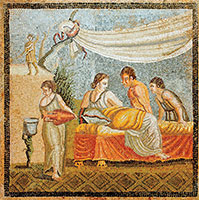
A Roman mosaic, first century ad © WHA/akg-images
The principate, Beard suggests, is resistant to plot construction. There’s a big civil war at either end of it, and a smaller one near the middle, but otherwise it’s mostly one emperor after another. Elite politics had a limited narrative repertoire: good or bad relations among the emperor, Senate, and legions; a smooth succession or a palace coup. It’s fun to learn that Commodus was strangled by his wrestling trainer, or that Domitian was stabbed by a steward, but, as Beard says, “one hastily contrived self-interested palace plot is usually much the same as any other.” As Robert Graves and the BBC showed with I, Claudius, dynastic drama is one way to go. But it’s hard to keep track of whose grandmother was Julius Caesar’s great-nephew’s sister, and there were four separate dynasties. Roman adoption practices add an extra layer of complication that makes some of the relationships almost unintelligible. One emperor had himself retrospectively adopted by one of his predecessors, who, by that time, had been dead for more than ten years.
Change is another problem. Again, it’s not that there wasn’t any, especially in the matter of who filled what role. The imperial household often promoted people from the lower rank of the aristocracy, and even from formerly enslaved managerial types, perhaps because they were thought less likely to have their eyes on the throne. People born in settled provinces filtered into the Senate: Tacitus was probably from the south of France. The same process led to emperors from Spain, and, eventually, Libya. But the roles themselves stayed the same. In spite of having, in one scholar’s reckoning, the bloodiest record of transfers of power of any long-lasting monarchy in history, Augustus’ system marched along for nearly three hundred years with hardly any modifications. According to Beard, one of the only recorded attempts to restore the republic was a speech, in 41 ad, which no one took seriously. You could have gone to sleep in 1 bc, she says, and woken up two hundred years later without noticing much difference, apart from the future tourist attractions that had sprung up.
Things would have looked different from the edges of the empire. The piecemeal conquest of Britain that started under Claudius, the destruction of Jerusalem under Vespasian, and Trajan’s wars in Romania, Armenia, and Iraq weren’t small events. All the same, says Beard, they didn’t alter the basic outline very much. In 117 ad, the eastern territories Trajan conquered brought the empire to its greatest extent: nearly two million square miles. When he died on the way home, the new provinces were already in revolt, and in less than two years they were gone. Strategists like Hadrian and Augustus put most of their efforts into lining up buffer states. Emperors were expected to be war leaders, and there were vanity projects. Beard says the invasion of Britain was one of them, though she patriotically calls the province “Rome’s Afghanistan.” But minor skirmishes on the frontiers, dressed up as triumphs, were usually enough for most rulers.
There’s a traditional solution to the boringness problem caused by all this stability. It’s to sort the emperors into good and bad, or, at a more ambitious level, to try to deduce the personal characteristics of each reign. This is where Beard starts one of the ground-clearing exercises that make her work so appealing. She doesn’t pretend that you can extract solid biographical information from even relatively hard-nosed and plausible writers like Tacitus, let alone his younger contemporary Suetonius, whose gossipy short biographies of the first twelve emperors—his count included Julius Caesar—are the source for nearly all the famous stories about them. She’s similarly up-front about the health warnings attached to a document known as the Historia Augusta,the only continuous Latin account of the second- and third-century emperors. Historians have been reluctant to give it up, but it seems to have been written a hundred years later than it purports to have been, and some of it is now agreed to be an ancient literary hoax, although no one knows who wrote it, or why.
Beard has no patience, either, for what she once called the “would have” school of biography, as in: “Like most Roman babies, Caligula would have been suckled by a wet nurse/swaddled for six months/potty-trained early.” In SPQR, a survey of ancient Rome from Iron Age settlements to the third century ad, she says flatly that “the qualities and characters of the individual emperors did not matter very much to most inhabitants of the empire, or to the essential structure of Roman history.” What’s more, “There is no sign at all that the character of the ruler affected the basic template of government at home or abroad in any significant way.” SPQR deals with imperial times in one brisk chapter, but people, and maybe publishers, are hung up on Roman emperors. Beard—who knows her way around the archaeology, art history, and written sources—gets past the impasse by looking at the empire as a symbolic system, stitching and unstitching a composite figure of “the emperor” as she goes.
That doesn’t mean she throws the stories out. The fundamental unit of Emperor of Rome is: “Here’s a colorful anecdote. Here’s why it’s probably exaggerated or not true. Here’s how it helps historians say something substantive anyway.” So all the old favorites are there, from Caligula ordering his invasion force to gather seashells instead of crossing the English Channel—the Latin word for “seashell” was also used for various bits of military gear, so it’s possible that some sort of ancient wordplay is behind this story, Beard reports—to Commodus’ gladiatorial antics in the arena, which, according to Cassius Dio, included spearing a hundred bears from a specially constructed walkway. Dio claims to have witnessed this, and Beard, for once, sees no reason to doubt it. Caligula’s proposal to make his horse a consul comes up, too. Like Commodus beheading an ostrich (when he’d finished with the bears), then waving the head at Dio and his colleagues, the story turns on a young emperor insulting the senatorial aristocracy, perhaps implying that they’d been putting up resistance of some kind. Either way, both emperors were soon assassinated.
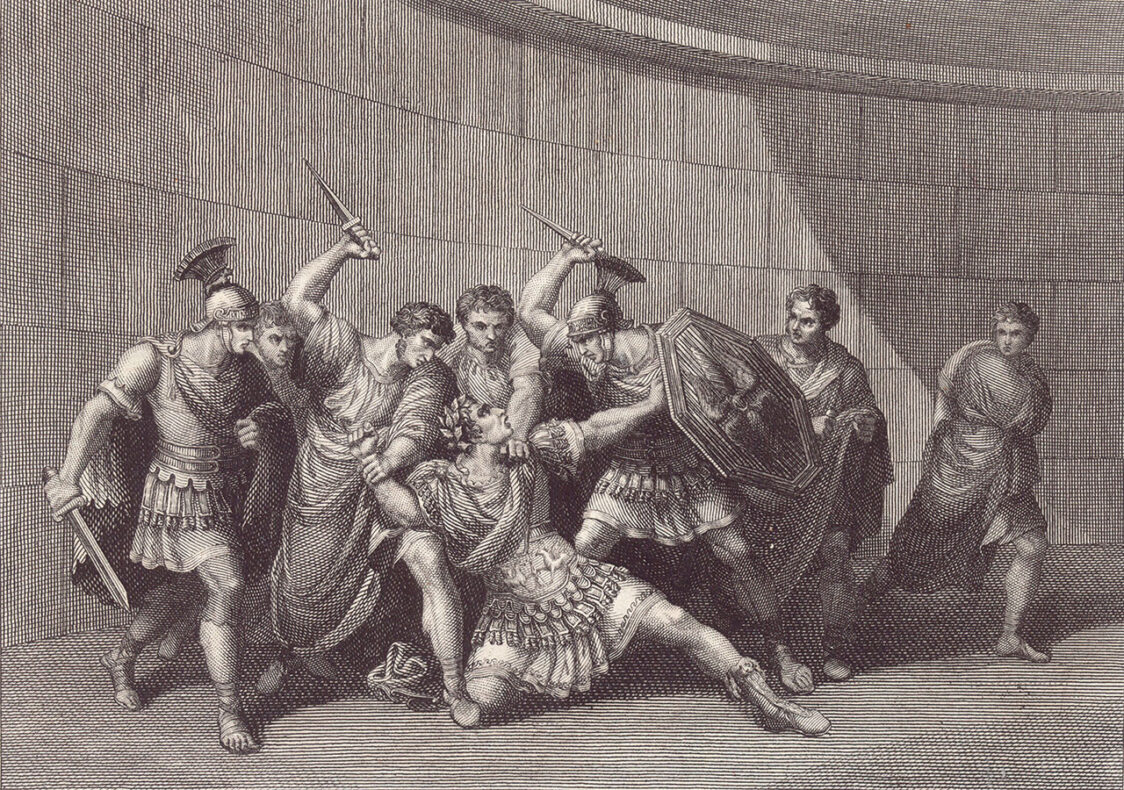
Death of Caligula, an etching by G. Mochetti after a drawing by Bartolomeo Pinelli, 1810 © akg-images
Beard is particularly interesting on the ways they got labeled “good” or “bad.” The aristocratic hearsay that’s behind the written sources was more likely to attach tales of cruelty and sexual deviance to rulers who failed to ease political tensions with the aristocracy. Three of the worst alleged monsters, Nero, Domitian, and Commodus, were replaced violently by founders of new dynasties who didn’t have any interest in encouraging anyone to make their predecessors look good. The run of five alleged good emperors, from Nerva to Marcus Aurelius, all chose their successors, who did. There’s no reason to turn the sources on their heads. Hadrian probably was a more reasonable guy than Nero. But each of them made a showy extended visit to Greece, had easily mocked artistic interests—Beard is scathing about Hadrian’s versifying efforts—and built himself a giant palace. Hadrian’s compound at Tivoli was nearly twice as big as ancient Pompeii. If he’d killed a few more senators, Beard suggests, all the material would have been there for memorializing him as another Nero, rather than the compellingly complicated character who’s typically imagined now.
When Beard was starting out, in the Seventies, academic historical debate in Britain took a peculiar form. Someone, often from Oxford, would amass an incredible quantity of learned detail about one subject or another, but take little interest in generalizing about it, or, sometimes, in interpreting it at all. Someone else, often from Cambridge, would then throw historiographical hand grenades at them, and everyone involved would have a good time. In Greek and Roman history, the chief bomb throwers were Moses I. Finley and Keith Hopkins, who brought sociological perspectives drawn from Max Weber and a harder emphasis on data analysis to the field. When, in 1977, Fergus Millar published a huge book called The Emperor in the Roman World, Hopkins delivered a fierce critique while attending Millar’s research seminar. The book was “a model of how ancient history should not be written,” he wrote in a lengthy review, which was published in a journal Millar edited.
Beard watched all this unfold as a graduate student in Millar’s seminar, and it would be easy to make too much of it. The disagreement was a bit more subtle than a details guy versus an ideas guy, and both parties took it for granted that old-fashioned political history centered on the emperors themselves was a waste of time. Even so, it gives one an idea of the minefield that Beard is threading her way through as she turns topics debated as strenuously as this into an easy, entertaining read. Millar’s slogan was “The emperor was what the emperor did,” and Beard follows him in tracing what the job entailed. Triumphing over foreign enemies was part of it, but so were maintaining buildings, providing disaster relief, responding to petitions, serving as a final court of appeal, and more. Beard puts more of an emphasis than Millar did on the bureaucrats who probably handled much of this, and she branches out into areas like the politics of succession and the semiotics of imperial dining rooms, in which water features played an unusually large part.
Still, each emperor also owned and operated a vast system of exploitation based on slavery, backed up by armed force and monumental propaganda. Ancient city-states were machines that sucked in tribute from local trade and agriculture, and one way of thinking about the Roman Empire is as a network of such cities, with Rome itself at the center, which took over the existing local machinery as it spread across the Mediterranean world and beyond. Local government’s main function was to keep a lid on rebellions, and Beard underscores the thinness of the Roman state: “No other empire in the history of the world has operated with so few official boots on the ground.” Imperial palaces turn out to be one of the best sources for evidence of the lives of the enslaved, though Beard points out that those in the mines and fields were treated very differently. As for the political activities and exciting sex lives of aristocratic Roman women, those stories were told as rumored instances of alarming deviations from a general pattern that, not surprisingly, was highly oppressive.
People also think about the Roman Empire because it’s good to think with, and historians, like novelists, playwrights, and screenwriters, haven’t been shy about using it to dramatize their own concerns. It’s just about possible that this tradition runs all the way back to Tacitus, whose most authoritative twentieth-century commentator, the British classicist Ronald Syme, became convinced that the Annals contained veiled criticisms of Tacitus’ living bosses. For Edward Gibbon in the eighteenth century, the second-century emperors were models of what an Enlightenment monarch ought to be. Theodor Mommsen, who won one of the first Nobel Prizes, in 1902, for his history of Rome, used his experiences in German politics after 1848 to animate his material. He wanted to bring the ancients down from their “fantastic pedestal,” he said: “That is why the consul had to become the burgomaster. Perhaps I have overdone it; but my intention was sound enough.” In the Thirties, Syme was thinking of Mussolini, Hitler, and Stalin when he overthrew the received wisdom that Augustus’ founding of the principate had been a dryly legalistic affair.
Then there’s the Romans’ apparent indifference to skin color, their apparent failure to be scandalized by same-sex desire, and their mostly enthusiastic attitude toward foreign religions. The moody teenager in me has always liked the idea of them as ancient existentialists, an idea sketched magnificently by Gustave Flaubert in a letter that, many years later, inspired Marguerite Yourcenar’s novel Memoirs of Hadrian:
The melancholy of the antique world seems to me more profound than that of the moderns, all of whom more or less imply that beyond the dark void lies immortality. But for the ancients that “black hole” was infinity itself; their dreams loom and vanish against a background of immutable ebony. No crying out, no convulsions—nothing but the fixity of a pensive gaze. With the gods gone, and Christ not yet come, there was a unique moment in history, from Cicero to Marcus Aurelius, when man stood alone. Nowhere else do I find that particular grandeur.
Yeah. But Beard is not in favor of this sort of thing. She’s a bit sniffy about Yourcenar’s postwar classic—“more akin to the ideas of the mid twentieth century than to those of the mid second”—and she pours cold or lukewarm water on fantasies of Roman multiculturalism. In the same spirit, she’s enjoyably withering about recent enthusiasm for Marcus Aurelius’ Meditations. A better translation of one traditional title for this collection of ancient platitudes would be Jottings to Himself, she says.
All the same, she likes one jotting, which Millar also used for the opening lines of his big book: a passage in which the emperor advises himself to “reflect continually on the fact that all such things as happen now, also happened before, and on the fact that they will happen again.” After considering the courts of various historical monarchs, Marcus Aurelius, in Beard’s snappier translation, concludes: “same play, different cast.” Beard uses the aphorism to sum up the static quality of the imperial system, and later applies it to the way Roman sculptors would turn a head of Nero into a head of Vespasian with a couple of small adjustments; the sculpted bodies were “always more or less identical.” Having flattened all the bullshit out of imperial Rome, she seems unwilling to reinflate it with fantasies or political commentary. In her closing passage, though, she aligns herself with Tacitus—it was all pretense, performance, a sham—and lands on the implication you’d expect. Augustus or Putin, Nero or Trump, Tiberius or Modi: in the end, they are always the same.

